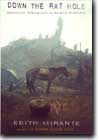| Our Publications | ||
| Books by Title | ||
| Books by Author | ||
| Books by Country | ||
| E-books | ||
| About | ||
| Orchid Press E-books | ||
| Distributed E-books | ||
| Our Bookshop | ||
| About Us | ||
| Browse Shop | ||
| How to Buy | ||
| Contact Us | ||
| WE BUY BOOKS AND LIBRARIES | ||
|
||
Book Reviews

Down The Rat Hole:
Adventures Underground on the Burma Frontier
byEdith Mirante
2005. 192 pp., 3 colour plates, 3 maps, 21.5 x 15.2 cm., softcover.
ISBN-10: 974-524-050-8 $21.00
ISBN-13: 978-974-524-050-6
Asian Non-fiction
Book review by Teri Fitsell
(South China Morning Post, 29 May 2005)
Edith Mirante has been aptly described by her publisher as “a dedicated writer with the soul of a poet and the passion of a revolutionary”. She describes herself simply as a gatherer of information on Myanmar. It’s a task to which this American artist has dedicated nearly 20 years of her life. Her commentaries are regularly broadcast on the BBC World Service, she’s lectured for Amnesty International and Greenpeace, and she’s given evidence about Myanmar before the US Congress.
Mirante’s first book, Burmese Looking Glass, was about her clandestine journeys into Myanmar from Thailand in the mid-1980s. It was subtitled A Human Rights Adventure and a Jungle Revolution and described how her eyes were opened to oppression in Myanmar. In 1986, she founded Project Maje (http://www.projectmaje .org) to disseminate information around the world about the plight of the Myanmese people. Her efforts in Thailand resulted in her being jailed twice and then deported in 1988.
Mirante’s new book is as interesting as the first. Starting in 1991, it describes her journeys through China, Laos, India and Bangladesh to talk secretly to indigenous people struggling to gain their freedom. She visits the rebel Chin National Front, active on the Bangladesh/Myanmar border; she crosses treacherous hills on the China border with members of the Kachin IO’s 3rd brigade to visit the Kachin State; and she hides out in Chittagong, Bangladesh, awaiting her chance to reach the Hill Tracts of Bandarban.
The book is so named after the words of an Arakan ruler who described “the futility of an army pursuing hill tribe raiders as an elephant trying to ‘enter the hole of a rat’”. However, Mirante says that, “in modern Burma, the elephantine Tatmadaw tramples everything in its path, rat holes, nests of insurgents, peaceful villages, alike”.
The book details not only human rights abuses but also the destruction of the Burmese environment under SLORC (the State Law and Order Restoration Committee, now known as the SPDC), “the junta ruling Burma following its suppression of the 1988 democracy uprising”. She describes unregulated logging, strategic deforestation, gas and oil exploration and gold mining, the use of dangerous pesticides such as paraquat and increases in pollution.
The list of environmental crimes is almost as long as the list of different factions of rebels struggling in these remote areas. There are the Chins, the Was, Kachins, Karens, Rakhines, Mons and many others. The succinct glossary help sort any confusion.
It’s the author’s no-frills passion for her subject, as well as her wit and humour, that make the book so readable. Her journeys comprise arduous days of hiking over hills, wading through streams and hiding from the authorities. Her aim is to reach the people who live in the midst of the struggle and destruction and tell their stories to the world. She rarely focuses on herself or how (or why) she endures the dangers, rigours and hardships that go with her task. Nor does she indulge in polemic or cries of outrage. She tells it as she sees it—quietly, without fuss, simply gathering information with which to confront the authorities later.
In Burmese Looking Glass, Mirante travelled among opium drug lords and troops of women soldiers. In Rat Hole, she enters the worlds of guerilla warfare and heroin and jade trading, and realises the full extent of the AIDs pandemic in the region.
The book covers one of the worst natural disasters of the 20th century—the typhoon and tsunami that engulfed Bangladesh in April 1991, killing 139,000. As she relates seeing bodies washed ashore and caught in trees, the passage has deep resonance, given the events of December 26, 2004.
Among the hardship and tragedy, there’s humour and irony. At one stage Mirante narrowly avoids being caught at a dangerous checkpoint because a truck in front of hers nearly swerves off the road, and by the time it’s salvaged the guard agrees there’s no time for security. She spends much time in cockroach-infested hotel bathrooms repeatedly dying her blonde hair black so as to blend in.
In the end though, Mirante’s message is a simple one, just the two words that close the book: “Free Burma.”.
[Read a review from the Irrawaddy Magazine] [More Orchid Press Reviews]
PO Box 70, Trinity TB, NL, A0C 2S0, Canada
Telephone: +1 709-330-4703